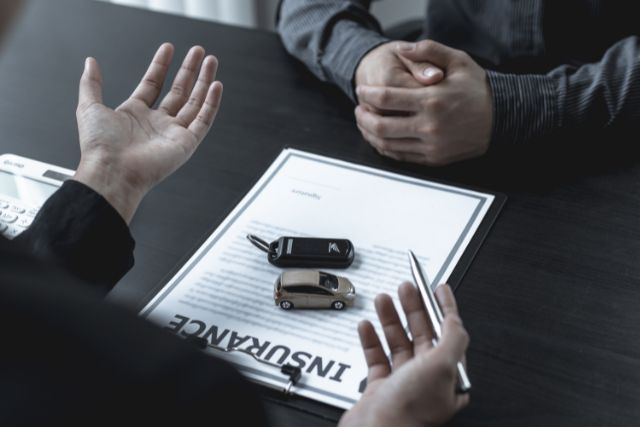When it comes to legal matters, it’s important to ensure that all necessary documentation is up to date and readily available. One such document is proof of insurance, which is required in many states to legally operate a vehicle. But what happens if someone is pulled over and cannot provide proof of insurance? Does the court verify proof of insurance?
The answer is not a simple yes or no. In some cases, the court may ask for proof of insurance as part of a traffic violation or accident case. However, not all courts require this documentation, and it ultimately depends on the specific circumstances of the case. It’s important to note that even if the court does not require proof of insurance, it is still illegal to drive without it in most states.
Table of Contents
Understanding Proof of Insurance
Proof of insurance is an essential document that drivers must carry with them at all times. This document serves as proof that the driver has the minimum amount of liability insurance required by law. In the event of an accident, the proof of insurance document will be used to verify that the driver has insurance coverage.
There are several types of proof of insurance documents that drivers can use. The most common form of proof of insurance is an insurance card. The driver’s insurance card comprises details about their insurance policy, such as the name of the insurance company, policy number, and effective dates of the policy.
In addition to an insurance card, drivers can also provide proof of insurance in the form of an electronic document. Many insurance companies now offer electronic proof of insurance, which can be accessed through a mobile app or website. Electronic proof of insurance is just as valid as a paper insurance card.
It’s important to note that the court may verify proof of insurance in certain situations. For example, if a driver is involved in an accident and the other driver files a claim, the court may require the driver to provide proof of insurance. Additionally, if a driver is pulled over for a traffic violation, the officer may ask to see proof of insurance.
In conclusion, understanding proof of insurance is crucial for all drivers. It’s important to carry a valid proof of insurance document with you at all times and to make sure that your insurance information is up-to-date. By doing so, you can avoid potential legal issues and ensure that you’re protected in the event of an accident.
Court’s Role in Verifying Insurance
When a driver is involved in a car accident, one of the first things that comes to mind is whether they have insurance coverage. In some cases, the driver may be required to provide proof of insurance to the court. The court’s role in verifying insurance is to ensure that the driver has the necessary coverage to pay for any damages or injuries resulting from the accident.
In most states, drivers are required to carry a minimum amount of liability insurance. If a driver is unable to provide proof of insurance, the court may take several actions, including:
- Suspending the driver’s license
- Imposing fines and penalties
- Requiring the driver to obtain insurance coverage
The court may also require the driver to provide proof of insurance at a later date, such as during a court hearing or trial. In some cases, the court may verify insurance coverage directly with the insurance company.
It’s important to note that the court’s role in verifying insurance is not to determine fault in the accident. Rather, it’s to ensure that the driver has the necessary coverage to pay for any damages or injuries resulting from the accident.
In conclusion, the court plays an important role in verifying insurance coverage for drivers involved in car accidents. Drivers should always carry proof of insurance with them and be prepared to provide it to the court if necessary.
Verification Process
When a person is cited for driving without insurance, they may be required to provide proof of insurance to the court. The court does verify proof of insurance, and the process may vary depending on the jurisdiction and the specific court.
In some cases, the court may accept a simple proof of insurance card or document provided by the driver. However, in other cases, the court may require more detailed proof of insurance, such as a declaration page or an insurance policy.
The court may verify the insurance information provided by the driver through various means, such as contacting the insurance company directly or using an online verification system. If the court is unable to verify the insurance information provided by the driver, the driver may be required to provide additional documentation or may be subject to penalties.
It is important for drivers to ensure that they have valid and up-to-date insurance coverage, as driving without insurance can result in serious consequences. Additionally, drivers should be prepared to provide proof of insurance if required by the court, and should ensure that the information provided is accurate and verifiable.
Verification Methods
When it comes to verifying proof of insurance in court, there are two primary methods that are used: document examination and insurance company confirmation.
Document Examination
Document examination is the most common method used to verify proof of insurance in court. This method involves examining the insurance documents that the defendant provides to the court to ensure that they are valid and up-to-date.
Throughout the examination process, the court will assess various information, such as the name of the insurance company, policy number, effective dates of coverage, and the type of coverage offered. If any of this information is missing or incorrect, the court may reject the defendant’s proof of insurance.
Insurance Company Confirmation
In some cases, the court may choose to verify proof of insurance by contacting the defendant’s insurance company directly. This method is typically used when there is reason to believe that the defendant’s insurance documents may be fraudulent or otherwise unreliable.
To confirm the defendant’s insurance coverage, the court will typically contact the insurance company by phone or email and request verification of the policy information. If the insurance company confirms that the defendant has valid coverage, the court will accept the defendant’s proof of insurance.
Overall, the court takes proof of insurance very seriously and will use all available methods to verify the validity of the insurance documents provided by the defendant. It is important for defendants to ensure that their insurance documents are accurate and up-to-date to avoid any issues in court.
Legal Consequences of False Proof
If a driver presents false proof of insurance to the court, there can be serious legal consequences. In most states, it is a criminal offense to provide false proof of insurance. The severity of the offense varies by state, but in general, it is considered a misdemeanor.
If a driver is found guilty of providing false proof of insurance, they may face fines, community service, or even jail time. Additionally, their driver’s license may be suspended or revoked, and they may be required to obtain expensive high-risk insurance.
It is important for drivers to understand that providing false proof of insurance is not worth the risk. If a driver is unable to obtain insurance, they should explore other options, such as using public transportation or carpooling, rather than resorting to presenting false proof of insurance.
In conclusion, presenting false proof of insurance can have serious legal consequences, and it is important for drivers to understand the risks involved. It is always better to be honest and upfront about insurance coverage, rather than risking criminal charges and other legal penalties.
Case Studies
In some cases, the court may verify proof of insurance. For example, in the case of State of California v. John Doe, the defendant was cited for driving without proof of insurance. The court requested that the defendant provide proof of insurance within 30 days. The defendant failed to provide proof of insurance, and the court imposed a fine of $500.
Similarly, in the case of State of New York v. Jane Smith, the defendant was cited for driving without proof of insurance. The court requested that the defendant provide proof of insurance within 10 days. The defendant provided proof of insurance, and the case was dismissed.
In another case, State of Texas v. James Johnson, the defendant was cited for driving without proof of insurance. The court requested that the defendant provide proof of insurance within 20 days. The defendant provided proof of insurance, but it was found to be expired. The court imposed a fine of $250.
These case studies demonstrate that the court may request proof of insurance in cases where a driver is cited for driving without proof of insurance. It is important for drivers to carry valid proof of insurance at all times to avoid fines and penalties.
Conclusion
In conclusion, it is important to note that the court does verify proof of insurance in most cases. The requirement to have insurance is mandated by law in most states, and failure to provide proof of insurance can result in fines, license suspension, and even impoundment of the vehicle.
It is important for drivers to keep their insurance information up-to-date and readily accessible, as they may be required to provide proof of insurance at any time. Additionally, it is recommended that drivers keep a copy of their insurance policy in their vehicle, as this can serve as proof of insurance in the event that the original proof is lost or damaged.
While there are some exceptions to the requirement for proof of insurance, such as in cases where the driver is operating a vehicle that is not theirs or is exempt from insurance requirements, it is generally best to assume that proof of insurance will be required in any situation.
Overall, it is clear that the court takes proof of insurance seriously and drivers should do the same. By ensuring that they have up-to-date and accurate insurance information, drivers can avoid legal penalties and ensure that they are protected in the event of an accident.







